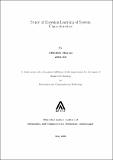Please use this identifier to cite or link to this item:
http://drsr.daiict.ac.in//handle/123456789/187| Title: | Study of bayesian learning of system characteristics |
| Authors: | Jotwani, Naresh D. Sharma, Abhishek |
| Keywords: | Bayesian statistical decision theory Machine learning Neural networks Computer science Artificial intelligence Bayes theorem Inference Probability theory Statistical analysis |
| Issue Date: | 2008 |
| Publisher: | Dhirubhai Ambani Institute of Information and Communication Technology |
| Citation: | Sharma, Abhishek (2008). Study of bayesian learning of system characteristics. Dhirubhai Ambani Institute of Information and Communication Technology, ix, 59 p. (Acc.No: T00150) |
| Abstract: | This thesis report basically deals with the scheduling algorithms implemented in our computer systems and about the creation of probabilistic network which predicts the behavior of system. The aim of this thesis is to provide a better and optimized results for any system where scheduling can be done. The material presented in this report will provide an overview of the field and pave the way to studying subsequent topics which gives the detailed theories on Bayesian networks, learning the Bayesian networks and the concepts related to the process scheduling. Bayesian network is graphical model for probabilistic relationships among a set of random variables (either discrete or continuous). These models having several advantages over data analysis. The goal of learning is to find the Bayesian network that best represents the joint probability distribution. One approach is to find the network that maximizes the likelihood of the data or (more conveniently) its logarithm. We describe the methods for learning both the parameters and structure of a Bayesian network, including techniques for learning with complete data also. We relate Bayesian network methods for learning, to learn from data samples generated from the operating system scheduling environment. The various results produced, tested and verified for scheduling algorithms (FCFS, SJF, RR and PW) by an Operating System Scheduling Simulator implemented in programming language JAVA. Here, the given code is modified according to requirements and fulfilling the necessary task. |
| URI: | http://drsr.daiict.ac.in/handle/123456789/187 |
| Appears in Collections: | M Tech Dissertations |
Files in This Item:
| File | Description | Size | Format | |
|---|---|---|---|---|
| 200611006.pdf Restricted Access | 524.98 kB | Adobe PDF |  View/Open Request a copy |
Items in DSpace are protected by copyright, with all rights reserved, unless otherwise indicated.
